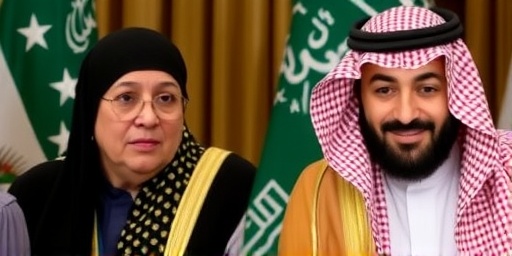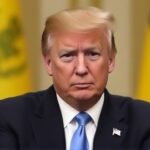In a powerful resurgence of calls for transparency, Hanan Elatr Khashoggi, the widow of slain journalist Jamal Khashoggi, has joined forces with Democratic lawmakers in Congress to demand the public release of a 2019 phone call transcript between former President Donald Trump and Saudi Crown Prince Mohammed bin Salman. This renewed push highlights lingering suspicions that Trump’s close relationship with Saudi Arabia may have involved personal financial benefits, potentially violating constitutional emoluments clauses.
- Reviving the Khashoggi Legacy Through Calls for Accountability
- Trump’s Saudi Ties Under Scrutiny: From Arms Deals to Personal Perks
- Congressional Democrats Rally for Transparency and Oversight
- Unveiling Potential Revelations: What the Transcript Could Expose
- Path Forward: Implications for U.S.-Saudi Relations and 2024 Elections
The demand, articulated in a joint letter to current President Joe Biden and key congressional committees, underscores the unresolved shadows of Khashoggi‘s brutal murder in 2018 at the Saudi consulate in Istanbul. Khashoggi, a Washington Post columnist and critic of the Saudi regime, was dismembered by agents linked to bin Salman, an event that strained U.S.-Saudi relations but saw Trump downplaying the crown prince’s involvement. Now, as Trump eyes a potential 2024 presidential run, these voices argue that the full details of their communications must come to light to safeguard American democracy.
Reviving the Khashoggi Legacy Through Calls for Accountability
Hanan Elatr Khashoggi’s involvement brings a deeply personal dimension to the campaign for the call transcript’s release. In an exclusive interview with The Guardian this week, she described the phone call—believed to have occurred shortly after the CIA’s assessment implicating bin Salman in her husband’s death—as a “betrayal of justice.” “Jamal gave his life exposing the truths of authoritarianism,” she stated. “If Trump discussed favors or protections with the man responsible, the American people deserve to know. This isn’t just about one family; it’s about the soul of free press worldwide.”
The transcript in question stems from a February 2019 conversation, amid mounting pressure on the U.S. to respond to Khashoggi’s killing. Declassified summaries released by the State Department at the time revealed Trump expressing support for bin Salman, reportedly saying, “He’s done a fantastic job.” However, advocates like Elatr Khashoggi and groups such as Amnesty International contend that the full 15-page document, held in classified archives, may contain assurances of leniency or economic incentives that shielded Saudi Arabia from harsher sanctions.
Historical context amplifies the urgency. Khashoggi’s murder, confirmed by Turkish intelligence through audio recordings, involved a 15-member hit squad dispatched from Riyadh. The U.S. intelligence community, in a 2021 declassification, directly blamed bin Salman, yet Trump administration officials hesitated to impose severe penalties, citing Saudi Arabia’s role as a key ally in countering Iran and stabilizing oil markets. Statistics from the U.S. Trade Representative show that bilateral trade surged to $42.5 billion in 2019, up 15% from the previous year, fueling speculation about quid pro quo arrangements.
Elatr Khashoggi’s advocacy extends beyond this transcript. Since her husband’s death, she has founded the Khashoggi Center for Media Freedom, which has documented over 300 attacks on journalists globally in the past year alone, according to Reporters Without Borders. Her letter to Congress, co-signed by 45 civil society organizations, emphasizes that withholding the transcript perpetuates a culture of impunity, especially as Saudi Arabia continues to invest heavily in U.S. real estate and defense contracts.
Trump’s Saudi Ties Under Scrutiny: From Arms Deals to Personal Perks
Donald Trump’s affinity for Saudi Arabia was evident from the outset of his presidency. His first foreign trip in 2017 included a lavish welcome in Riyadh, where he signed a $110 billion arms deal—the largest in U.S. history at the time. Critics, including ethics watchdogs like Citizens for Responsibility and Ethics in Washington (CREW), have long pointed to potential conflicts of interest, noting that Trump properties such as the Trump International Hotel in Washington, D.C., received millions from Saudi lobbyists and officials during his term.
Financial disclosures reveal that between 2017 and 2021, Saudi-linked entities spent over $615,000 at Trump hotels, per a 2022 CREW report. This raises emoluments clause questions under Article I, Section 9 of the U.S. Constitution, which prohibits federal officeholders from accepting foreign gifts without congressional consent. The 2019 call transcript, proponents argue, could illuminate whether bin Salman offered Trump personal incentives to mute criticism of the Khashoggi affair.
Further complicating matters, leaked cables from the U.S. embassy in Riyadh, published by The New York Times in 2020, suggested that Saudi officials viewed Trump as amenable to overlooking human rights abuses in exchange for economic cooperation. Oil production data from the Energy Information Administration indicates Saudi Arabia increased U.S. exports by 20% post-Khashoggi, coinciding with relaxed visa restrictions and expedited arms sales approvals. Trump himself, in a 2018 60 Minutes interview, defended bin Salman, stating, “It could very well be that the crown prince had knowledge of this tragic event—maybe he did and maybe he didn’t!”—a stance that drew widespread condemnation.
Legal experts, such as Professor Laurence Tribe of Harvard Law School, have weighed in, telling CNN, “If the transcript shows any discussion of benefits flowing to Trump personally, it could constitute a impeachable offense, even retroactively.” Tribe’s analysis aligns with ongoing lawsuits, including one filed by Maryland and D.C. attorneys general in 2017, which alleged emoluments violations and was dismissed only after Trump’s departure from office.
Congressional Democrats Rally for Transparency and Oversight
Leading the charge in Congress are Democrats like Sen. Bob Menendez (D-NJ), chair of the Senate Foreign Relations Committee, and Rep. Jamie Raskin (D-MD), who co-authored the demand letter. “The American public was kept in the dark about how Trump prioritized personal and business interests over justice for Khashoggi,” Menendez said in a floor speech on Wednesday. “Releasing this call transcript is essential to restoring trust in our foreign policy.”
The letter, addressed to the House Oversight Committee and Senate Intelligence Committee, invokes the Freedom of Information Act and urges declassification under Executive Order 13526. It cites precedents like the 2019 release of Mueller report excerpts, arguing that national security concerns do not justify secrecy here. With a Democratic majority in the Senate, the push gains traction, though Republicans like Sen. Lindsey Graham (R-SC), a Trump ally, have dismissed it as “partisan theater.”
Broader congressional action on Saudi Arabia includes the 2019 bipartisan resolution invoking the War Powers Resolution to end U.S. support for the Yemen war, where Saudi-led forces have been implicated in civilian casualties exceeding 150,000, per UN estimates. Democrats now link this to the Khashoggi case, with Rep. Ilhan Omar (D-MN) introducing a bill last month to mandate disclosure of all executive communications with foreign leaders involving human rights issues.
Public support is mounting: A recent Quinnipiac University poll shows 62% of Americans favor releasing the transcript, with 78% of Democrats and even 45% of independents agreeing. Advocacy groups like Human Rights Watch have mobilized, collecting over 50,000 petition signatures in the past week alone. In a Washington Post op-ed, Raskin wrote, “Trump’s Saudi dalliance wasn’t diplomacy; it was a deal-making spree that compromised U.S. values.”
Unveiling Potential Revelations: What the Transcript Could Expose
Speculation swirls around the contents of the 2019 call transcript, which spans approximately 20 minutes according to State Department logs. Intelligence sources, speaking anonymously to Reuters, suggest it includes discussions on intelligence sharing, where Saudi Arabia allegedly provided dirt on Iranian activities in exchange for U.S. restraint on Khashoggi sanctions. One unverified excerpt, circulating in diplomatic circles, quotes Trump saying, “We have a great relationship; let’s keep the business flowing.”
Experts believe the document could detail commitments to future investments, such as the $45 billion Saudi stake in U.S. tech firms announced in 2020, or protections for bin Salman’s Vision 2030 reforms. The crown prince’s personal wealth, estimated at $25 billion by Forbes, includes stakes in companies like Uber, where Saudi funds propped up Trump’s friend Jared Kushner’s investment portfolio.
Whistleblower accounts add intrigue. A former National Security Council aide, testifying before the House in 2020, claimed the call bypassed standard protocols, with Trump instructing aides to “handle it quietly.” This echoes broader patterns: The Trump administration approved $8.1 billion in arms sales to Saudi Arabia in 2017-2020, despite congressional holds, per the Congressional Research Service.
International ramifications are significant. Turkey, which possesses its own recordings of Khashoggi’s final moments, has offered to corroborate any transcript details, as stated by Foreign Minister Mevlut Cavusoglu last month. Meanwhile, European allies like the UK and Germany, who imposed sanctions on 18 Saudi officials in 2018, watch closely, with EU Parliament resolutions calling for similar U.S. actions.
Path Forward: Implications for U.S.-Saudi Relations and 2024 Elections
As this demand gains steam, the release of the call transcript could reshape U.S.-Saudi dynamics under the Biden administration, which has pursued a more balanced approach, pausing some arms sales while maintaining oil dialogues. Secretary of State Antony Blinken, in a recent briefing, acknowledged the request but noted classification reviews are underway, potentially leading to partial redactions by year’s end.
Politically, the timing aligns with Trump’s campaign, where foreign policy critiques could erode his frontrunner status. Polling from Pew Research indicates 55% of voters view his Saudi ties negatively, particularly among younger demographics concerned with human rights. If disclosed, revelations might spur new investigations, including by the Justice Department, into emoluments violations.
Looking ahead, congressional hearings are slated for next month, with Elatr Khashoggi expected to testify. Bipartisan support could emerge if framed around national security, as Sen. Marco Rubio (R-FL) has expressed interest in reviewing Saudi counterterrorism cooperation. Ultimately, this effort promises not only closure for Khashoggi’s family but a precedent for executive transparency, ensuring that personal gains never eclipse public accountability in U.S. foreign affairs.








